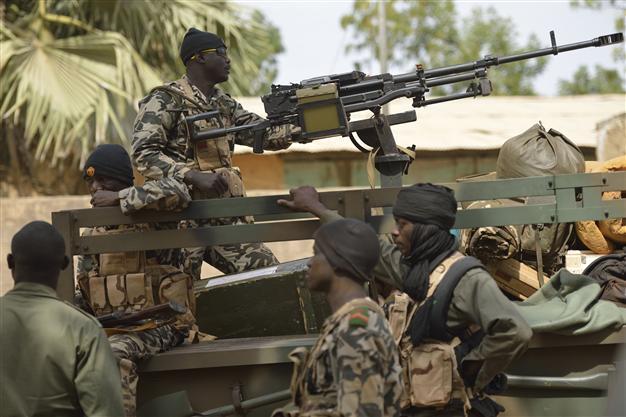French-led forces retake key north Mali town from Islamists
BAMAKO - Agence France-Presse

Malian soldiers patrol aboard a vehicule mounted with a machine gun in a street of Diabaly (400km north of the capital Bamako) on January 26, 2013. French-led Malian troops recaptured the Islamist stronghold of Gao, today, the biggest town in northern Mali, and troops from Niger and Chad "will now take up the baton," the French defence ministry said. AFP photo
French-led troops Saturday recaptured the Islamist stronghold of Gao in a spectacular boost to a 16-day-old offensive against Al Qaeda-linked rebels holding Mali's vast desert north.
The seizure of Gao, the most populated town in Mali's northern region which is roughly the size of Texas, was announced by the French defence ministry and confirmed by Malian security sources.
Paris said troops from Niger and Chad "will pick up the baton" and that the town's mayor Sadou Diallo would arrive in Gao from the capital Bamako later Saturday.
"A first contingent of Malian, Chadian and Nigerien troops are presently in Gao to help secure the town," a Malian security source told AFP by telephone from the town. In a parallel pincer-like movement, troops from Chad and Niger moved towards the Malian border from the Niger town of Ouallam, which lies about 100 kilometres (60 miles) southeast of Gao.
The French-led forces had overnight seized Gao's airport and a key bridge on the southern entrance of the town, held by the Al Qaeda-linked Movement for Oneness and Jihad in West Africa (MUJAO).
French defence ministry sources said a report in French newspaper Le Monde that hundreds of Islamists had died since the French military intervention in Mali was "plausible." An alliance of Tuareg rebels who wanted to declare an independent homeland in the north and hardline Islamist groups seized the northern towns of Gao, Timbuktu and Kidal in April last year after a coup in Bamako.
The Islamist groups include MUJAO, Ansar Dine, a homegrown Islamist group, and Al-Qaeda in the Maghreb, of which MUJAO is an offshoot.
The Islamists then sidelined the Tuaregs to implement their own agenda. Their harsh interpretation of Islamic sharia law has seen transgressors flogged, stoned and executed, and they have forbidden music and television and forced women to wear veils.
French Prime Minister Jean-Marc Ayrault said the troops were currently "around Gao and (will be) soon near Timbuktu," a fabled caravan town on the edge of the Sahara desert which for centuries was a key centre of Islamic learning.
The MUJAO meanwhile said it was ready for negotiations to release Gilberto Rodriguez Leal, a French national of Portuguese origin who was kidnapped in western Mali in November.
"The MUJAO is ready to negotiate the release of Gilberto," said spokesman Walid Abu Sarhaoui. "We Muslims can come to an understanding on the issue of war," he added, without elaborating.
But Ayrault snubbed the offer, saying "we will not give in to blackmail" and added: "We cannot cede to terrorism because if this is the case they will win every time." West African defence chiefs meanwhile met to review the slow deployment of regional forces to bolster the French-led offensive against Islamist militants at an emergency meeting in Ivory Coast's main city Abidjan.
Although the Economic Community of West African States (ECOWAS) regional bloc has pledged more than 4,500 soldiers, their deployment has been delayed by financing and logistical problems.
Chad, which neighbours Mali and is not an ECOWAS member, has promised a total of 2,000 additional troops. They were sent to Niger to join 500 local troops to open a new front against the Islamists.
While a fraction of the African forces has arrived in Bamako and is slowly deploying elsewhere, the French and Malian forces have done all the fighting so far.
France has already deployed 2,500 troops to Mali.
